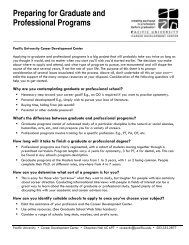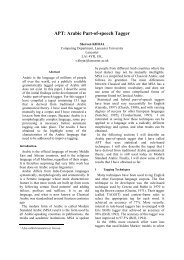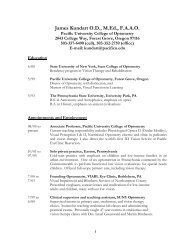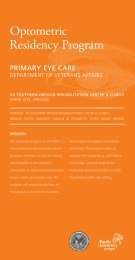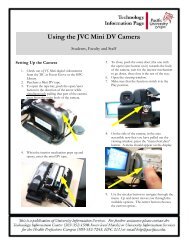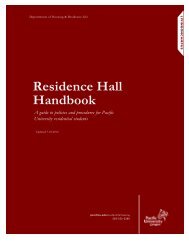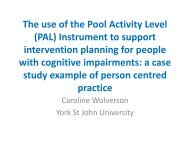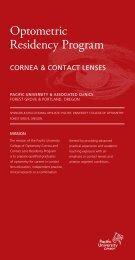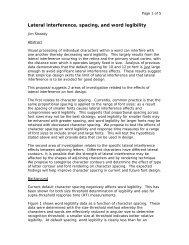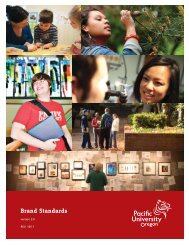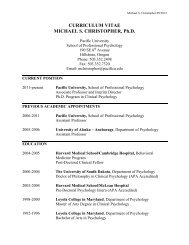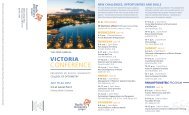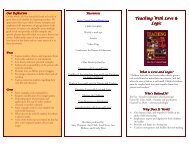Effective Interviewing Skills (PDF) - Pacific University
Effective Interviewing Skills (PDF) - Pacific University
Effective Interviewing Skills (PDF) - Pacific University
Create successful ePaper yourself
Turn your PDF publications into a flip-book with our unique Google optimized e-Paper software.
<strong>Interviewing</strong>:Entry PointInto Your Profession<strong>Pacific</strong> <strong>University</strong>Career Development Center
TIPS AND TYPES OF INTERVIEWS“The real art of conversation is not only to say the right thing in the right place,but to leave unsaid the wrong thing at the tempting moment.” Dorothy NevilleTIPS ON INTERVIEWING• Be prepared and do your homework!• Practice, but don’t memorize• Be sincerely interested• Be “real”• Have a sense of humor• Have an opinion• Be an active listener• Inquire into the mission of the organization• Know what type of interview will be heldTYPES OF INTERVIEWSThere are different types of interviewing that cantake place. There is a big difference betweeninterviewing one on one and a panel interview. Beprepared and find out who will be around the tablebefore you enter the interview. You can gain thisinformation by calling ahead and speaking with theinterview coordinator.ScreeningAllows an employer to screen out candidates whoaren’t the right fit and screen in candidates whomay be. Usually used if the employer hasdetermined a pool of qualified candidates, butwants to meet candidates in person to gauge theirfit to the position and the organization.One on OneProvides an opportunity for an employer to learnmore about your experience, skills and personalinterest in the organization. Usually used if theemployer feels you are qualified, but wants todetermine your fit to the role and the organization.PanelSeveral employees gather to question onecandidate to determine fit. This can include potentialpeers, supervisors, subordinates, and sometimes thestakeholders or clients are present.Job FairProvides an opportunity to explore variousorganizations and positions, get in front of recruiters,size up the applicant competition, and begin todevelop a network.GroupProvides an opportunity for the employer to placeseveral candidates into a competitive interviewingsituation to see which candidates will make thegrade and have the right fit. Usually used if hiringfor several positions at a time.MarathonProvides the employer an opportunity to have youspend an extended time at the organization with across-section of people to determine if you have theright fit. Also provides an opportunity to assess yourgenuineness and enthusiasm for the position incomparison to other candidates.InformationalThis type of interviewing is very different from a jobinterview in that you the jobseeker have made thearrangements. This provides an opportunity to getyour foot in the door (skills, résumé, interest) and tolearn more about a profession, organization and/orindustry. Initial appointment scheduled by phone, e-mail or letter with an in-person meeting.BEFORE• Assess your interests, values &skills• Research industry, profession,organization & position• Practice but don’t memorize• Make copies of your résumé• Know who will be conducting theinterview• Dress the part• Get directions & parking detailsTIMELINE CONSIDERATIONSDURING• Get there early• Bring copies of your résumé• Practice professional etiquettetowards all you meet• Answer questions withexamples and evidence• Be an active listener• Ask thoughtful questions• Demonstrate a true interestplus a keen sense of curiosityAFTER• Send thank-you note/s• Follow-up with moreresearch• Determine if the site, job,and culture are a good fit• Evaluate what went welland what to improve• Continue your job search(don’t sit around waitingfor “the call”)
TIMELINE CONSIDERATIONS: PRIOR TO THE INTERVIEWKnow Yourself Know the Profession1) KNOW YOURSELFTake some time before the interview to do some introspection and self-evaluation. Working through the followingexercises is a positive way to transform the “before interview jitters” into constructive activity. By completing thisworksheet, you are preparing to answer a broad range of questions rather than a few specific questions. Resist thetemptation to memorize “pre-recorded” answers—they will sound contrived. The value of these exercises is toconsider your assets and shore up your deficits. As you work through this line of inquiry you will develop a strongersense of all you can do and what is important to you.Working through this worksheet is basically a solitary exercise, however if you get stuck, consider asking a friend orfamily member to give you feedback. Pull out some of your old syllabi or refer to a catalog to remind yourself ofskills learned in the classroom. Retrieve old job descriptions to recollect responsibilities and duties performed. Alsoconsider scheduling a time to meet with a career advisor to take an inventory to clarify your interests, skills, values orpersonal preferences. Call x2916 to schedule an assessment. Another effective way to prepare for the interview is toschedule a mock interview and gain helpful feedback from a career advisor. Call x2845 or x2916 to schedule atime.INTERESTS ~ Would the work keep your attention?Rate the following interests with 1 being high and 4 being low (state a brief reason for your interest):____helping, serving, informing, caring for, or instructing peopleReason for interest:____working with facts, numbers, files, accounts, or business proceduresReason for interest:____developing insights, theories, and innovative ways of doing your workReason for interest:____operating machines, tools, or materials such as wood or metalReason for interest:APTITUDES ~ Do you have what it takes?What skills does this particular position require?Which of these skills do you have?What evidence can you provide to demonstrate your abilities?What skills are missing?Strategies to shore up weak area:VALUES ~ Does the work have meaning for you?Would you value group work or autonomy? Why?
What type of work environment would you be most productive in?Do you enjoy solving problems under pressure?Would you avoid pressure and lean towards a more tranquil work environment?Would you value a job that generates respect among friends, family and community?Do you value a high or low degree of activity and novelty in your work environment?When you get up in the morning, what type of work would move you quickly toward the door?At the end of the day, what do you hope to have accomplished?PERSONAL PREFERENCE ~ Would it be a good fit?List inter-personal skills you have developedcommunication stylelearning approachrole as team memberConsider your personalitywhat motivates youhow you solve problemshow you approach projectswhat energizes youlist personal strengthsno modesty allowed—be honest and let your good works shine!:list personal weaknessesappropriate disclosure—no reason for interviewer to run screaming!:describe strategies to overcome weaknesseslessons learned or reframe weakness:
2) KNOW THE PROFESSIONResearch done prior to the interview can make the difference between a job offer and no offer. One of the mostcommon recruiter complaints about candidates is that they didn’t know much about the broader industry, theprofession in general, their specific organization, let alone the position at hand and didn’t take the time to find out.The good news is that research done prior to the interview will make you stand out as a candidate and there aremany resources to help you in the process.Utilize internal and external sources of material. Internal resources are those documents the organizationproduces; it is what they have to say about themselves. This includes company website, employee handbook,company newsletter, brochures or recruitment video’s. External resources are what outside sources have to sayabout the industry, profession in general, the target organization and/or the job at hand. This includesnewspapers, professional journals and association websites. Word of mouth is an effective resource as well ~talk to professors, alumni, friends and family.INDUSTRY CONCERNS AND FRONT PAGE NEWSWhat pressing issues are facing the larger industry?How might demographics impact the organization?What technological advances are anticipated?How might current political and social trends affect the profession?PROFESSIONAL ASSOCIATIONS AND SOCIETIESWhat research is “hot” within the profession?Who are the thought leaders in the field?What are the current areas of concern to the professionals?What are the average salaries of professionals (beginning wage vs. experienced)?ORGANIZATIONAL CULTURE AND MISSIONWhat makes the organization distinct? What is their “brand”?What is their mission?What does the ideal candidate profile look like?What is the reputation of organization within the larger community?
ExpressionEye ContactEnergyBody MovementAttentive ListenerTIMELINE CONSIDERATIONS: PRIOR TO THE INTERVIEWMock Interview FeedbackMeet with Career AdvisorNon-verbal communication:ObservationCommunication <strong>Skills</strong>ObservationVoice QualitySpeaking RateExpressiveness/ClarityGrammarPauses/SilenceContentObservationStresses positives and strengthsRelates self to programExamples, descriptors, statisticsProvides relevant informationDemonstrates knowledge/interestHandles liabilities/weaknesses
TIMELINE CONSIDERATIONS: DURING THE INTERVIEWStages: A Natural ProgressionWhile not all interviews will follow the exact stages as laid out in this chart, the interview will consist of abeginning, middle and ending. Most hiring decisions are made during the first five minutes, so don’t minimize theintroduction stage—first impressions do count! During the middle stage you will most likely discuss education,experience and/or goals in any order or sequence. You can count on being asked where you have been(education) what you have done (experience) and where you are going (goals). Naturally there will be a time todiscuss the position at hand. This is where all your hard work preparing for the interview will pay off! Close bynoting specific information on the hiring timeline and leave on a positive note.STAGE POSSIBLE TOPICS INTERVIEWER CONCERNS YOUR PARTIntroduction• Greeting• Image compatible with • Appropriate dress(bonding/impression) • Small talkprofession• Well groomedmany decisions are made • Build Rapport• Poise, manners, ease in • Firm handshakeduring the first 5 minutes. • Opening questionsocial situation • Eye contactEducation • Reason for choosingschool/profession• Areas of interest• Special achievementsRelatedExperience/internship/field work/ summer jobs/part time work and otherrelevant experience• Nature of experience• Level of responsibilities• Major accomplishments• Problems faced• Work preference• Relevance of educationto program• Sufficiency of training• Breadth and depth ofknowledge• Intellectual capability• Motivation• Relevance ofexperience• Basic work ethics• Realistic awareness ofstrengths andweaknesses• Productivity• Energy level• Interpersonal skills• Friendliness• Relate key aspects ofeducation• Emphasize skillsgained (problemsolving, leadership,etc.• Give examples• Match skills toprogram needs.• Build bridge -past experience.• Examplesemphasizingstrengths• Evidence basedresponsesCareer Goals • Short & long termgoals• Understand profession• Motivation• Desire for furthertrainingDiscuss Position • Responsibilities• Current and futuretrends• Opportunities withinorganizationsClosing• Discuss deadlines andprocess• Parting ways on acordial note• Clarity of goals• Seriousness of purpose• Career oriented• Interest in profession• Preparation• Knowledge of position• Interest in learning• Summarize and end thetime together.• Final appraisal ofcandidate• Be clear about goalsand how they relateto position at hand• Relate how they willbenefit theorganization• Be prepared to askinformed andrelevant questions• Be careful not to askquestions inliterature/web• Provide evidence• Be sensitive and don'tover stay yourwelcome• Note hiring timeline• Observe “ending”cues• Thank you
TIMELINE CONSIDERATIONS: AFTER THE INTERVIEWLessons LivedLessons LearnedAnswer these questions immediately after the interview. Most folks forget 80% of the content within 48 hoursafter the interview. Seize the opportunity to glean the lessons learned from the experience.Things learned about the position/organization:Things you learned about yourself:What were the questions they asked:What went well:What you would do differently:What needs to be done next:Write note of thanksResearch topicDecision dateContact personContact referralTally Ho! Move on to the next job lead. For good mental health, don’t sit around waiting for “the call”. It maynever come. Most organizations will contact the people they don’t hire. However some (less civilized)organizations never take the time to let you know they have hired someone else. Keep your job search movingforward until you have a bona fide job offer in hand.It could have been a spectacular interview from your perspective, but for one reason or another, they choseanother candidate. Don’t get discouraged and don’t take it personally! There are many reasons why anemployer chooses one candidate over another that may have absolutely nothing to do with you; the boss’s nieceapplied, they hired someone who talked like, smiled like (or smelled like) the previous valued employee. Youwon’t know why, and they would never admit the true reason. Pack your job search bag, hit the resume road,and keep up the good work. The best position may yet to be discovered. As you move away from one more no,you are getting that much closer to the big YES!



